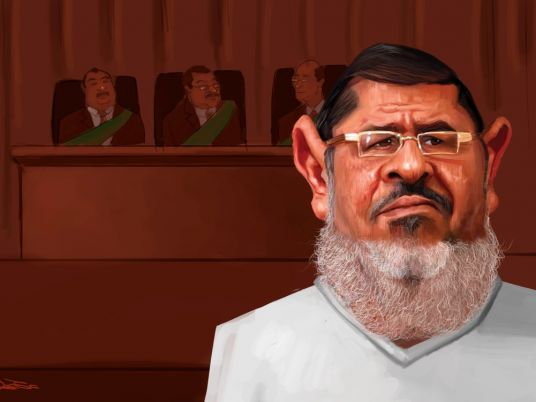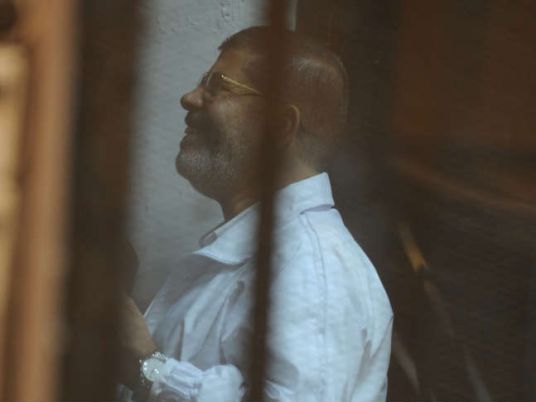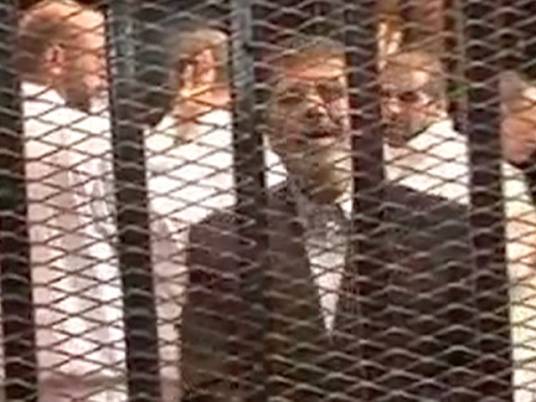
In a rare move, the ousted president Mohamed Morsy will likely forgo a lawyer and represent himself during the trial slated for 4 November.
Morsy, who has been held by authorities in incommunicado since his ouster, will be the first high-profile defendant in Egypt to represent himself in court.
The trial, scheduled to start on Monday at Tora Police Institute, will occur amidst security concerns that his likely demagogic speech and first public appearance since his ouster on 3 July could trigger waves of pro-Morsy protests nationwide.
If Morsy’s appearance is similar to that of other Brotherhood members, he will likely cater his speech to Islamists in Egypt and allies across the Muslim world to portray himself and his organization as victims of a military coup.
Morsy is on trial with 14 other Brotherhood members on charges of “inciting the killing” of anti-Morsy protesters who clashed with his supporters outside the presidential palace in December 2012, leaving six people dead and 450 injured, according to the Health Ministry.
The pro-Morsy Anti-Coup Alliance says Morsy has rejected the authority of the court on the basis that he is still the “legitimate president and he did not commit a crime.”
“No lawyers will be defending president Mohamed Morsy, neither Egyptians nor foreigners, because the president does not recognize the trial or any action and processes that result from the coup,” the alliance said in a statement on Monday.
The move to forgo a defense lawyer has also been confirmed by his defense panel, including spokesperson of ex-president Mohamed Morsy’s defense team Mohamed al-Damaty and Freedom and Justice Party (FJP) legal committee member Mohamed al-Sisi, who will be attending the trial.
Al-Damaty said the former presidential hopeful Mohamed Selim al-Awa is the only lawyer who will work with Morsy during his trial. Awa will submit a request to the court enabling the team to meet Morsy in his prison but not defend him.
Al-Sisi told Al-Masry Al-Youm the commission formed to defend Morsy during his trial’s first session on Monday will take part merely as observers, adding that the president’s trial is simply an attempt to undermine confidence in the ousted president.
Damaty argues the attendance of lawyers defending Morsy does not mean recognition of the trial’s legitimacy, adding that they had not yet received permission to access the trial and that they do not yet know if it will be granted.
The team’s stance conforms to that of Morsy’s during his last speech when he expressed his willingness to sacrifice for the sake of legitimacy, Damaty says.
Damaty added that the defense team will defend 15 suspects, seven of whom are fugitives, including: Awa, Damaty, Nabil abdel Salam, Saleh al-Senousy, Mohamed Tosson, Mohamed al-Masry, Atef Shehab, Montasser al-Zayyat, Mahmoud Youssef, Osama al-Helw and Fathy Tamim.
Some members of Morsy’s defense panel will not attend Morsy’s trial as they are also wanted by security forces, says Al-Sisi.
Constitutionally speaking, in case the defendant does not assign a lawyer to represent him, the judge is tasked with appointing him a lawyer and the defendant speaks only when the judge asks him to speak, says Mohsen Bahnasy, a human rights lawyer. “Otherwise, it would be violating human rights,” he told Egypt Independent.
Morsy’s decision to defend himself is a sign that he just wants to appear as a hero, says Mohamed al-Araby, head of the Conference party.
Haitham Shehab, a revolutionist who participated in 25 Jan uprising, agrees, adding that Mubarak was more rational than Morsy as he appointed the most famous lawyer in Egypt to represent him and he is in better situation now. “For Morsy, he just wants to rely on persuasion rather than documented evidence as Mubarak’s lawyer did,” he said.
However, the cases of Mubarak, the former pillar of Egypt’s political elite, and Morsy, the inexperienced underdog, are vastly different. Dr. Seif Abdel-Fattah, Professor of Economics and Political Science at Cairo University and former adviser to former President Morsy, said in Mubarak’s case, people knew his conditions and his whereabouts. Mubarak, unlike Morsy, was also able to contact his family.
In a speech at a conference entitled “Presidential Trial- Guarantees and Rights,” Abdel-Fattah argued that Morsy should be treated the same way as former President Mubarak. “At least people knew about Mubarak’s detention center,” he said.
Bahnasy believes the circumstances surrounding Morsy’s detention have already tainted his chances at a fair trial. “The judicial proceedings are somehow lawfully unfair, given he was hidden in secret detention, without appointing a lawyer to defend him,” he said. “And just the idea he does not feel safe, along with the vagueness or the blackout concerning the interrogation process are enough to show it is basically a politically motivated case.”
To illustrate his case, Bahnasy points to former Interior Minister Ahmed Gamal Eddin, who was the responsible for the police, whose job it was to maintain public order during the December 2012 clashes but instead withdrew from the area around the presidential palace. Despite his crucial role to defend the palace during the clashes, Eddin was not interrogated for his role. “Was he abstained from getting involved and that is why Morsi fired him? Prosecution should prove this. Otherwise he should be tried as well,” Bahnasy said.
Al-Sisi agrees, adding that the president is not responsible for crimes merely because they took place at the presidential palace. “This does not happen in any country,” he said.
“Morsy’s trial is primarily political as there are no de facto charges against him,” Abdul Ghafour Shemais, a leader of the Islamic Jihad group, told Al-Masry Al-Youm on Saturday.
“Such trial could end in 24 hours if ongoing negotiations between Muslim Brotherhood and the Armed Forces succeeded,” he said.
The pro-Morsy Anti-Coup Coalition said it would hold a massive rally outside the court on Monday. “The mass rally on Monday… should be outside the (South Cairo Police Officers’ Academy) building in Tora,” said a statement from the Anti-Coup Coalition, which is led by the Brotherhood.
In response to the expected violence, the Egyptian Interior Ministry announced on Thursday a status of alert for all its sectors ahead the trial. “Twenty thousand conscripts from different sectors of the interior ministry are taking part in the trial’s security plan and will deploy on Saturday, two days before the trial,” MENA quoted a security official as saying.
Morsy’s conflict with the judiciary and the broader deep state during his presidency will witness a new chapter as he is now a defendant in a trial that could further deepen the already widening divide between the military establishment and the Islamists.
Update: Morsy’s trial, Al-Ahram Online reports, has been moved to the same place as where Mubarak’s trial took place: the Police Academy, outside of Cairo.


